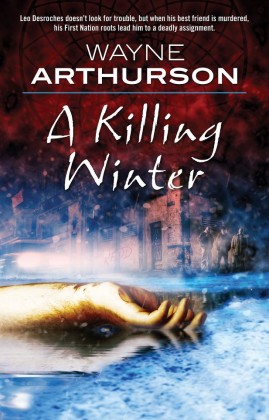BOOK REVIEW: Personal demons make the story in A Killing Winter
Posted on April 17, 2012 By LH Thomson Culture, Front Slider, Lit
 One of the reasons “write what you know” is a maxim is that it works for many people. And it works in A Killing Winter – Wayne Arthurson’s second novel about a jaded journalist investigating a murder. He’s written about what he knows.
One of the reasons “write what you know” is a maxim is that it works for many people. And it works in A Killing Winter – Wayne Arthurson’s second novel about a jaded journalist investigating a murder. He’s written about what he knows.
But here’s the surprise: it’s not daily newspapers. And it’s not crime reporting. The Edmonton aboriginal novelist has a dicey – an occasionally wonderfully inventive – hold on those at best.
It’s addiction.
More specifically, it’s addiction as a response to social disconnection, and the anxieties it produces. He’s done his research.
A Killing Winter is ostensibly a newspaper action pulp, from the old school. Rough-and-tumble, down-and-out hack Leo Desroches battles his own demons and chases down stories that are risky, because he doesn’t value his own life much. And it’s the demons that make the story.
Arthurson understands the nature of addiction – its use as a substitute for security, particularly the broken trust bonds of group and family security. When Leo rambles introspectively for two pages about how his life is falling apart, it’s bang on. People connect and care about characters this vulnerable. Keep in mind this character has been addicted to gambling, nearly killed twice, and robbed banks on the side. (An odd choice: I actually knew a reporter here who’d done exactly that – and was an addict. Unlike Leo, he didn’t get away with it and served four years in Bowden.)
All the while, Arthurson layers on the emotional self-judgment as foils for his character’s ultimately good nature. He also recognizes it in others, such as his recognition that “Video Mike” is just as addicted to his handheld game as Leo is to the gaming tables. There’s an emotional rawness, and the firm convictions of someone who has dealt with the numbing agony of social disconnection.
As someone who worked in daily newspapers for nearly 20 years, I can also say that Arthurson’s daily newspaper impressions are all just a little bit off, like a funhouse mirror image of the real thing. This won’t bother the average reader, but as someone who’s literally been there and done that, it’s rather annoying. No one covers non-fatal car accidents unless there’s a bizarre twist; stories aren’t routinely spiked for space anymore, because newspapers don’t have the staff numbers to spike local copy; an editor who slapped a reporter in the middle of the newsroom would probably be unemployed in about 20 minutes. I could go on. Some elements are badly out-of-time, remnants of the old days, while others are contemporary, such as the “joy” of blogging and tweeting while trying to get a story done.
As for the story and writing? It has really strong moments, and some really weak ones, throughout. Leo is a great character and the story is good … but not great. His editor deserves an ass kicking for not spotting several ponderous and repetitive phrases – something I can’t put on the author, who cranks out 80,000 plus words and deserves a little better support than that. Little things, like characters using each other’s names too much: nobody does that in real life. And pacing: for example, there are pages devoted to unveiling this kid’s body and it’s all just way over the top, way too much dialogue, too much delay. It doesn’t build suspense, it just annoys. There are also moments where the dialogue is a little forced, as if Arthurson forgot the “voice” he was writing in for a few moments.
Fortunately, we get more Leo than “Leo and friends,” and when he’s writing as Leo in the first person, Arthurson writes well. It’s passionate and personal and the voice is darkly rich, vividly describing street life and Edmonton’s inner city, without turning it into a Boyle McCauley travelogue of woe.
Arthurson noted in our recent interview that his Leo books sell well even though he hasn’t has as much critical recognition as other local authors yet. He should be glad: to write something that entertains while still being personal enough to evoke an emotional connection in others is a rare thing. He’ll probably sell a lot of books, of increasing quality, for a lot of years to come.
Will A Killing Winter someday be considered his classic? No. Arthurson has better in him. But it is a good book, and a good read, which is why people vote with their wallets.
The book launch takes place at the Artery this Wednesday at 7 p.m., no cover.











